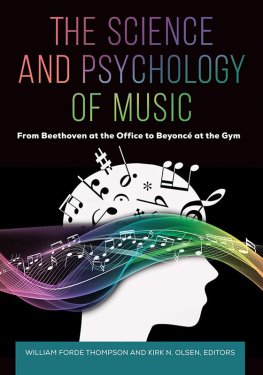Thompson William Forde - The Science and Psychology of Music: from Beethoven at the Office to Beyoncé at the Gym
Here you can read online Thompson William Forde - The Science and Psychology of Music: from Beethoven at the Office to Beyoncé at the Gym full text of the book (entire story) in english for free. Download pdf and epub, get meaning, cover and reviews about this ebook. year: 2020, publisher: ABC-CLIO, LLC, genre: Children. Description of the work, (preface) as well as reviews are available. Best literature library LitArk.com created for fans of good reading and offers a wide selection of genres:
Romance novel
Science fiction
Adventure
Detective
Science
History
Home and family
Prose
Art
Politics
Computer
Non-fiction
Religion
Business
Children
Humor
Choose a favorite category and find really read worthwhile books. Enjoy immersion in the world of imagination, feel the emotions of the characters or learn something new for yourself, make an fascinating discovery.
- Book:The Science and Psychology of Music: from Beethoven at the Office to Beyoncé at the Gym
- Author:
- Publisher:ABC-CLIO, LLC
- Genre:
- Year:2020
- Rating:5 / 5
- Favourites:Add to favourites
- Your mark:
- 100
- 1
- 2
- 3
- 4
- 5
The Science and Psychology of Music: from Beethoven at the Office to Beyoncé at the Gym: summary, description and annotation
We offer to read an annotation, description, summary or preface (depends on what the author of the book "The Science and Psychology of Music: from Beethoven at the Office to Beyoncé at the Gym" wrote himself). If you haven't found the necessary information about the book — write in the comments, we will try to find it.
The Science and Psychology of Music: from Beethoven at the Office to Beyoncé at the Gym — read online for free the complete book (whole text) full work
Below is the text of the book, divided by pages. System saving the place of the last page read, allows you to conveniently read the book "The Science and Psychology of Music: from Beethoven at the Office to Beyoncé at the Gym" online for free, without having to search again every time where you left off. Put a bookmark, and you can go to the page where you finished reading at any time.
Font size:
Interval:
Bookmark:

The Science and Psychology of Music
Copyright 2021 by ABC-CLIO, LLC
All rights reserved. No part of this publication may be reproduced, stored in a retrieval system, or transmitted, in any form or by any means, electronic, mechanical, photocopying, recording, or otherwise, except for the inclusion of brief quotations in a review, without prior permission in writing from the publisher.
Library of Congress Cataloging-in-Publication Data
Names: Thompson, William Forde, editor. | Olsen, Kirk N., editor.
Title: The science and psychology of music : from Beethoven at the office to Beyonc at the gym / William Forde Thompson and Kirk N. Olsen, editors.
Description: Santa Barbara : Greenwood, an imprint of ABC-CLIO, 2021. | Includes bibliographical references and index.
Identifiers: LCCN 2020010260 (print) | LCCN 2020010261 (ebook) | ISBN 9781440857713 (hardcover) | ISBN 9781440857720 (ebook)
Subjects: LCSH: MusicPsychological aspects. | MusicSocial aspects.
Classification: LCC ML3830 .S29 2021 (print) | LCC ML3830 (ebook) | DDC 781dc23
LC record available at https://lccn.loc.gov/2020010260
LC ebook record available at https://lccn.loc.gov/2020010261
ISBN: 978-1-4408-5771-3 (print)
978-1-4408-5772-0 (ebook)
25 24 23 22 21 21 1 2 3 4 5
This book is also available as an eBook.
Greenwood
An Imprint of ABC-CLIO, LLC
ABC-CLIO, LLC
147 Castilian Drive
Santa Barbara, California 93117
www.abc-clio.com
This book is printed on acid-free paper 
Manufactured in the United States of America
This book is dedicated to all the musicians around the world whose craft and creativity have enhanced human experience, enriching our emotional lives, identities, friendships, and well-being. We also dedicate this book to the hundreds of scholars, ranging from fine arts to neurosciences, who have brought deep insight and understanding to the science and psychology of music.
Contents
Music is everywhere. Every society worldwide engages in musical activities, and our engagement begins in infancy with lullabies and continues in various forms throughout our lives. Music is a constantlike the air we breathe or the blood that flows through our veins. For this reason, we often take music for granted and rarely stop to think about why it plays such a crucially important role in our lives. Why should a sequence of human-made sounds, produced in inventive ways and in a range of contexts, be a source of worldwide activity, fascination, and appreciation?
In 2018, it was estimated that Beyonc and Jay-Z, as a couple, were worth roughly $1.25 billion. From one standpoint, they accumulated this enormous wealth because they are talented at imagining and stringing together sounds in ways that people appreciate. Bono, with the band U2, has sung to huge stadiums of fans all around the world. At one concert in Pasadena, California, close to one hundred thousand people packed into the Rose Bowl to hear them play. An outsider to their music might be forgiven for wondering what the fuss was all about. Bono can sing a memorable tune, but why the worldwide adulation? In the 1960s, protest songs by musicians such as Joan Baez, Judy Collins, Pete Seeger, Phil Ochs, and Bob Dylan helped to build and then fuel a global peace movement in response to the Vietnam War, including the famous anti-war student movement that began at the University of California, Berkeley.
In 2020, the global pandemic profoundly impacted the careers of musicians, with classical and popular music concerts cancelled across the globe, and venues that would normally support local musicians shut down. Musical communities were also disrupted as people went into isolation. Yet as people adjusted to the new reality, music began to re-emerge from the balconies in Italy, to online collaborations and performances such as virtual choirs and orchestras. Music was a natural human response to the isolation and anxiety that people were experiencing, and it was a source of healing and hope.
The profound power of music to affect people from all walks of life is one of the great mysteries of science. It is being vigorously investigated by musicologists, psychologists, neuroscientists, physicists, and a range of other scholars. The aim of this book is to provide an introduction to some of the main scientific investigations, theories, and discoveries about music and how it affects our emotions, thoughts, identities, and social lives. All the chapters have been authored by world-leading experts on the science and psychology of music. They bring firsthand experience and knowledge of their chosen topics to provide exciting and accessible accounts of each topic area.
Just as music is found in many different contexts and is used for different reasons, there are many intriguing questions that can be asked about music. What is special about the sounds that are used as the building blocks of musicthe notes, chords, drumbeats, and vocalizations? Is music different in every culture or are there certain commonalities in the various musical sounds and activities that occur across cultures? What does it take to become an expert musician? Why are some people gifted at music, whereas others, no matter how hard they try, are tone deaf? What happens in our brains when we listen to music, and what are its effects on memory, emotion, and health?
Rather than answering all possible questions about the science and psychology of music in one long explanation spanning hundreds of pages, we have instead organized the book into three parts: (1) Understanding Music, (2) Psychological and Social Implications of Music, and (3) Impact and Applications of Music. Each part addresses a distinct and coherent set of issues related to the science and psychology of music and can stand on its own as an independent resource for teachers, students, and interested readers. Each part also addresses five core topic areas, giving rise to fifteen topics across the entire book.
Part 1, Understanding Music, describes the various ways that scientists think about music: (1) how they attempt to define music (What Is Music?); (2) how they understand and compare musical practices around the world (Music across Cultures); (3) how they investigate the nature of musicianship (Musical Expertise); (4) how they understand child prodigies (Musical Prodigies and Savants); and (5) how they investigate music through the lens of the human brain (Music and the Brain). Because every topic addresses a complex question, it is further divided into distinct questions that are addressed across four chapters written by different scientists and theorists.
Part 2, Psychological and Social Implications of Music, deals with five different topic areas: (1) how music helps us to construct or reinforce a sense of our identity (Music and Identity); (2) how musical preferences and skills are affected by personality (Music and Personality); (3) why music is used to accompany and celebrate rituals such as births, marriages, and birthdays (Music and Ritual); (4) the influence of music on religious and other beliefs (Music and Belief); and (5) how music can bring people together, strengthening our friendships and reinforcing the trust that we form with people around us (Music and Social Bonding). Such issues speak to the powerful ways that music shapes and helps constitute our identities and human societies. As in is addressed across four chapters.
(3) the intimate association between music and movement (Music and Movement); (4) the application of music for health (Music and Health); and (5) the application of music for education (Music Education).
Font size:
Interval:
Bookmark:
Similar books «The Science and Psychology of Music: from Beethoven at the Office to Beyoncé at the Gym»
Look at similar books to The Science and Psychology of Music: from Beethoven at the Office to Beyoncé at the Gym. We have selected literature similar in name and meaning in the hope of providing readers with more options to find new, interesting, not yet read works.
Discussion, reviews of the book The Science and Psychology of Music: from Beethoven at the Office to Beyoncé at the Gym and just readers' own opinions. Leave your comments, write what you think about the work, its meaning or the main characters. Specify what exactly you liked and what you didn't like, and why you think so.











